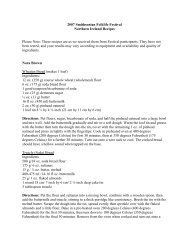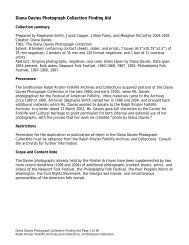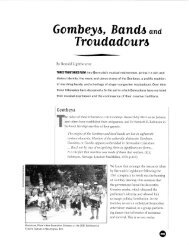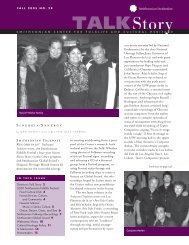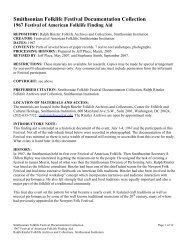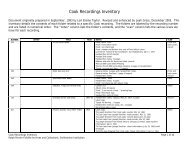Who Owns Traditional Medical Knowledge? - Smithsonian Center ...
Who Owns Traditional Medical Knowledge? - Smithsonian Center ...
Who Owns Traditional Medical Knowledge? - Smithsonian Center ...
Create successful ePaper yourself
Turn your PDF publications into a flip-book with our unique Google optimized e-Paper software.
MAKING HERITAGE LEGIBLE 175<br />
Classification (IPC). 52 The TKDL is, in other words, possibly one of the most<br />
important documentations of TMK in the public domain. As one measure of its<br />
impact, several developing nations in Asia and Africa are now following the WIPO<br />
model to develop the possibility of creating similar databases of medical knowledge.<br />
53 Meanwhile, in a related effort within India, some regional states have<br />
started TMK registries or Community Biodiversity Registers—village or districtlevel<br />
participatory initiatives that collect indigenous knowledge through existing<br />
local decentralized political structures, and are intended to work in parallel with<br />
the national database. 54<br />
But within Ayurvedic practitioner circles, the technocratic, top-down nature of<br />
the electronic database has not escaped criticism. In the first instance, Indian library<br />
and technology experts suggest that digital media technologies are far more<br />
fragile, prone to degradation, and obsolescence than earlier thought; now they wonder<br />
if TKDL funds might have been better focused on the preservation or conservation<br />
of the texts themselves. 55 A more important and far-reaching set of critiques<br />
comes from the critical development literature, which argues that this headlong<br />
rush toward digitizing knowledge transforms the very nature of medical heritage:<br />
specimens are turned into derivatives and practical knowledge is decontextualized,<br />
raising serious questions about the commensurability of indigenous knowledge<br />
with Western science.<br />
Scholars like Arun Agrawal suggest that there are fundamental epistemological<br />
contradictions at the heart of TKDL and, indeed, of indigenous knowledge database<br />
creation itself. As an example of ex situ conservation, the instrumental logic<br />
of database creation encourages a set of homogenizing processes whereby knowledge<br />
is particularized (separated as types and fixed in time), validated (abstracted<br />
from context), and generalized (catalogued, archived, and circulated)—processes<br />
that strip away all the detailed, contextual aspects that could even potentially mark<br />
it as indigenous. Much like Scott’s argument about practical knowledge, Agrawal<br />
claims that this essentially scientizing process is ultimately untenable; indigenous<br />
knowledge can never be thus isolated. When implemented as state practice, indigenous<br />
knowledge databases could well be Scott’s potential disaster waiting to unfold.<br />
More than anything else, they ensure that utility and value become the only<br />
operating principles in the archiving of indigenous knowledge—a self-fulfilling<br />
circular logic by which only useful or potentially valuable knowledge, however defined,<br />
become worthy of protection.<br />
These inherent epistemological tensions within databases are, however, not the<br />
only problems that plague the TKDL. The most interesting response and counterclaim<br />
has come from the shuddha or pure Ayurvedic practitioners, a subgroup or<br />
professionalizing faction among Ayurvedic advocates in postcolonial India who<br />
were not consulted during the database creation. Since the 1940s, the politics of<br />
professionalizing Ayurveda has been divided into two streams of revivalists: the<br />
straights, or the shuddha practitioners, and the integrated practitioners, who believed<br />
it was necessary to compete with biomedicine by borrowing its institutional



